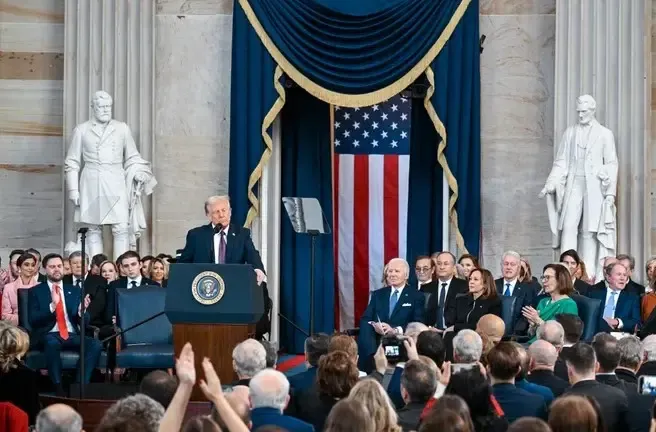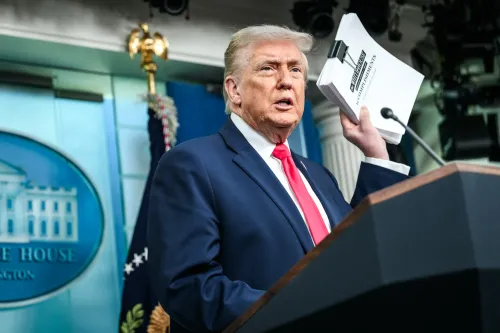President Trump Proclaims National Energy Crisis

Synopsis
Key Takeaways
- Trump declared a national energy emergency to boost U.S. energy production.
- The U.S. is the world's largest producer of crude oil and natural gas.
- Emergency powers may ease environmental regulations on energy projects.
- Trump aims to counter Biden's electric vehicle initiatives.
- Alaska's natural resources are a focus for new energy strategies.
Washington, Jan 21 (NationPress) US President Donald Trump on Monday announced a national energy crisis through an executive order aimed at reducing energy expenses and enhancing U.S. oil and gas production.
This declaration marks the first of its kind by the federal government and is expected to allow for an increase in energy output by utilizing emergency powers, as reported by Xinhua news agency.
The United States stands as the leading producer of both crude oil and natural gas globally and is also the foremost exporter of liquefied natural gas (LNG).
This emergency declaration is just one of several measures Trump was anticipated to implement on Monday to strengthen the U.S. oil, gas, and power sectors while trying to slow down former President Joe Biden's efforts to promote the electric vehicle sector.
"America will reclaim its status as a manufacturing powerhouse, and we possess something that no other manufacturing nation can match: the highest volume of oil and gas of any country on Earth, and we will put it to use," Trump stated during his inauguration speech at the U.S. Capitol.
"We will drill, baby, drill."
Biden entered the presidency with the intention of reducing the U.S.'s reliance on fossil fuels; however, U.S. oil and gas production reached unprecedented levels during his administration as drillers pursued high prices following sanctions on Russia due to its invasion of Ukraine.
Trump has emphasized that the U.S. is engaged in an artificial intelligence arms race with China and other nations, making the substantial energy demands of the industry a national priority.
According to projections by the Department of Energy, the power requirements for U.S. data centers could nearly triple within the next three years, potentially consuming up to 12 percent of the nation's electricity due to demands from artificial intelligence and other technologies.
The previous Trump administration had contemplated employing emergency powers under the Federal Power Act to fulfill a promise to rescue the coal industry but did not proceed.
This time around, the President could utilize emergency powers to alleviate environmental restrictions on power facilities, expedite the construction of new plants, simplify permitting for transmission initiatives, or open federal land for new data centers.
Trump also indicated that the U.S. would revoke what he described as an electric vehicle mandate, asserting that it would benefit the American auto sector.
"The overarching theme is truly about unleashing affordable and reliable American energy," remarked a Trump official earlier in the day.
"Since energy influences every aspect of our economy, it is also crucial for restoring our national security and establishing American energy dominance worldwide."
Trump reiterated that the U.S. is in a race for artificial intelligence supremacy with China and others, highlighting the critical energy needs of the industry.
He also stated that the U.S. will "refill our strategic reserves completely, right to the top" and export energy globally.
Biden had sold a record amount of crude oil from the U.S. Strategic Petroleum Reserve, exceeding 180 million barrels.
This sale helped maintain gasoline prices after Russia's invasion of Ukraine but depleted the SPR to its lowest level in 40 years.
Trump had promised during his first administration to refill the SPR to assist domestic oil companies suffering from low demand during the pandemic peak, a promise that was not fulfilled.
Additionally, Trump is expected to sign another order focused on utilizing natural resources in Alaska, repealing many of Biden's electric vehicle initiatives, and protecting gas-powered appliances from federal and local regulators aiming to phase them out of homes and businesses, according to an incoming official.
Alaska has been a contentious region regarding energy and environmental issues, with Republicans long seeing potential for oil and gas production there, while Democrats aim to protect its pristine landscapes.
The official noted that Trump would take "decisive action to unlock Alaska's natural resource potential," citing its wealth of resources such as oil and gas, seafood, timber, and critical minerals.
Many of these actions were anticipated and fulfilled campaign promises made by Trump on the campaign trail.










